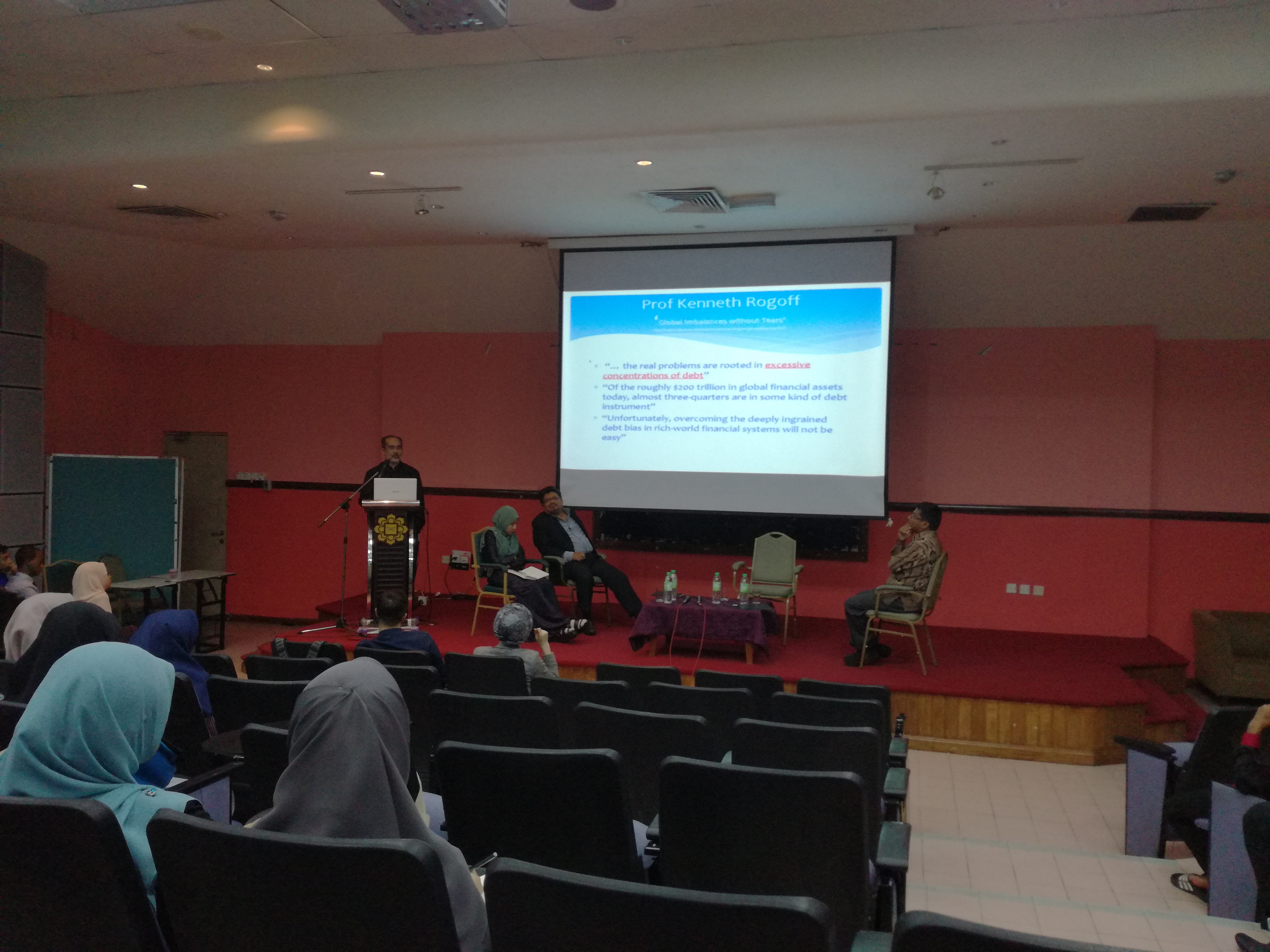By Mazlan Yusof
GOMBAK, 4 April 2017: A talk aimed at educating Muslims on financial independence based on Islamic teachings was held today at the IIUM Mini Auditorium in Gombak campus.
Titled “Usurisation or Islamisation: A look into the economy, finance markets and banking system today, the talk was jointly organised by IIUM Islamic Finance Student Council (IFSC), consumer advocate, Unriba, and Movement for Monetary Justice, a Muslim NGO.
Three panelists from the academic and banking areas presented their views at the talk. They were Prof. Dr. Mohd Nazari Ismail, lecturer from Faculty of Business and Accountancy Universiti Malaya, Prof. Dr. Mohamad Aslam Mohamad Haneef, Director for Centre of Islamic Economics IIUM, and Dato Abdul Manap Abdul Wahab, formerly of Bank Muamalat Malaysia.
Prof. Nazari opened the discussion on the financial and social havoc financial debts that had unleashed on the world due to the debt-creation practices of conventional banking.
He said even though Islamic banking had been largely spared from the global financial meltdown as what had happened to the American banking industry a decade ago, Islamic banking had also been guilty of dabbling in various practices similar to that in conventional banking which was debt-creation.
If Islamic banking continues to remain on this unhealthy and sinful course, Prof Nazari said “Islamic banking in its current form could never be the alternative to conventional banking for the world”.
Prof. Mohamad Aslam in his presentation urged practitioners in Islamic banking to cease from the practice of debt-creation and quickly switch to risk-sharing in their banking practices if they wanted to truly call themselves Islamic banking.
To do this, he said, the Islamic banking industry needed to put into practice the substantive knowledge which is the Turath of maqasid al shariah or Islamic theology and the methodological or modern knowledge in finance, economic and banking.
Prof. Mohamad Aslam said for this mindset to take place, Islamic academics in the fields of usuluddin and fiqh, finance, banking and economics had the obligation to be more proactive since they were responsible in imparting the correct understanding and knowledge of Islamic-based economic, finance and banking to both students and the public at large.
Meanwhile, Dato Abdul Manap was more blunt in his presentation. He said, Islamic banking could never be truly Islamic for the simple reason that Islamic banking and financial services were merely aping conventional banking practices and labelling their products and services with Islamic-sounding names while in actuality they were behaving like conventional banking.
He specifically referred to how Islamic banks got themselves into the role of traders of goods and services with little concern for the clearly prohibited provision in Islam against unfair and exploitative profiting at the expense of the buyer.
According to Dato’ Abdul Manap, what Islamic banking had been doing was copying what conventional banking had also been doing for the past three hundred years; debt creation and gaining profits at the expense of the buyer or the customer.
He was particularly scathing about Islamic banking services in Malaysia when many Muslim house buyers were made to bear all the losses when houses the buyers had thought they were getting were never built and the banks called in their bank loans.These cases had been highlighted many times by the Muslim Consumer Protection Association.
In their closing remarks the three panelists urged Muslims to be more knowledgeable on the dangers of credit-based financing and as individuals, need to stay clear of debt-based banking services. They said for their financial needs and services, Muslims should opt for saving and investing in savings institutions like Tabung Haji or wealth funds.
Many of those who attended the talk today were students in finance, banking and economics.***
